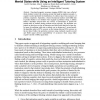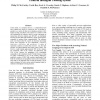120 search results - page 8 / 24 » Interactivities in Music Intelligent Tutoring System |
UMUAI
2008
14 years 10 months ago
2008
Abstract. Self-efficacy is an individual's belief about her ability to perform well in a given situation. Because selfefficacious students are effective learners, endowing int...
EDM
2010
15 years 12 days ago
2010
Functional magnetic resonance imaging (fMRI) data were collected while students worked with a tutoring system that taught an algebra isomorph. A cognitive model predicted the distr...
AIED
2007
Springer
15 years 5 months ago
2007
Springer
Razzaq and Heffernan (2006) showed that scaffolding compared to hints on demand in an intelligent tutoring system could lead to higher averages on a middle school mathematics post-...
FLAIRS
2007
15 years 1 months ago
2007
In this study, we compared Entailer, a computational tool that evaluates the degree to which one text is entailed by another, to a variety of other text relatedness metrics (LSA, ...
AAAI
2007
15 years 1 months ago
2007
Many intelligent tutoring systems (ITSs) have been developed, deployed, assessed, and proven to facilitate learning. However, most of these systems do not generally adapt to new c...


